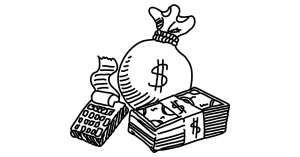It's never too early to learn how to manage your money. But the best time to learn is when you're a young adult. With no bills to pay or necessary purchases to make, the money you earn now is yours to spend as you like.
However, even though this makes splashing your cash all the more tempting, poor personal finance can lead to you missing out on days out with friends, leaving you with no savings, and making it far more challenging to learn vital personal finance skills for your future.
Having said all that, if you're working or doing chores to earn money, saving every penny will leave you feeling like you've got nothing to show for your hard work. That's why these personal finance tips are designed so you can save money where it counts, and enjoy spending it on things and experiences that are genuinely fulfilling.
Let's dive in…
What is Personal finance, and Why Does it Matter?
Personal finance is a broad concept, so it's helpful to think of it as a set of skills. It allows you to:
- Manage your money
- Decide when to save and when to spend
- Spend on things you really want/need
- Think about ways to invest to earn more money
- Prepare for your future
Like any skill, it's honed through practice. When you create a monthly budget, put some cash aside for driver's ed, or decide not to order takeout now so you can head to a restaurant with your friends this weekend, you're honing your personal finance skills.
The main reason all this matters is that it'll allow you to achieve your financial goals while still having money left over, just in case you ever need it.
How to Set Financial Goals
Financial goals can be as big or small as you like, from saving for concert tickets to putting money aside for college. But, as you can probably tell, achieving these goals usually requires earning and saving money. Thankfully, there are a few ways to make this easier, including:
Make your goal as specific as possible
If you aim to buy your first car, this gives you something to work towards. However, there's lots more to consider beyond the cost of the vehicle itself, including registration, insurance fees, and safety inspections and repairs. Knowing how much these will cost will give you a concrete amount to work towards.
Next, give yourself a time limit. A 'deadline' will help you work out how much you'll need to save and for how many months. For example, if a new car costs $2500 and you're taking your test in a year, you'll need to save around $210 monthly to purchase your car in time. Or, if you want to buy your car as quickly as possible, you can save $420 a month for six months.
Brainstorm ways to earn
Once you've got an amount for your goal, it's time to think about how you'll earn it. Of course, getting a job is the easiest way to do this. Some stores hire under-18s, but you can also check with small businesses in your local area. Look online for applications, and draw up a resume to take into stores in person.
Another way to earn money is by offering services. You can earn money unofficially by doing chores for neighbors, tutoring kids at your local middle school, babysitting, and pet sitting. Another great thing about earning money this way is the great experience you'll get, which you can put on your resume or college application.
Budget
Once you've done the hard part of finding a way to earn money, you'll need to figure out how much to save every month. Budgeting is by far the best way to do this.
Budgeting Basics
Budgeting is an essential part of personal finance. Mastering it now will save you a lot of headaches when you have expenses like insurance payments, electricity, phone and internet bills, groceries, and rent or mortgage payments, which take up a considerable amount of your monthly earnings and make it much harder to save.
What You'll Need
All you'll need to create your budget is a pen and notebook. With a thick notebook or even a ring binder, you'll have enough space to create budgets for years to come and can look back over your past budgets to see how much you've saved.
But if you prefer to be more hands-on, many people use a Pinterest board, whiteboard, or Excel spreadsheet to budget. Others prefer to have pouches, each one dedicated to one set of expenses, which they can put their income into each month. Several budgeting apps are also available, some of which link with your bank account to track purchases.
There are many options for creating budgets, so try a few methods to find the one that works best for you. Creating a habit is important when it comes to budgeting, so try to pick an easy method that won't take too much time and that you won't forget to do.
Setting Out Your Budget
Again, budget layouts can be varied, but the most basic is to have one column for income and earnings and another for outgoings. Outgoings are amounts you must spend every month, like money for public transport to work, snacks, clothes, and subscriptions.
Add up the totals at the bottom of these columns, then subtract them from each other. The amount you're left with is what's known as disposable income. For example, if you earned $500 this month but spent $100 on outgoings, you're left with $400 of disposable income.
Your savings will come out of this disposable income. Using the amount you worked out when you chose your financial goal, you'll know how much you need to save every month. The amount of disposable income you don't put into your savings is money you can spend on whatever you like.
Perfecting Your Budget
It'll take a few months to get the hang of budgeting, especially if your monthly earnings change. Remember, a few dollars in the wrong column here and there is to be expected. Plus, if you want to dip into your savings for something that's not your financial goal, this will be fine as long as you're happy to save for a little longer.
Real setbacks start happening when you spend irresponsibly…
Spending Responsibly
Spending responsibly means making choices that help you achieve your financial goals while allowing yourself to enjoy the money you've worked hard to earn. It's about finding a balance between treating yourself and staying on track. Here are some tips to do just that:
Learn to Recognize Impulses
If you're like 88% of Americans, you've definitely bought things that you've never used again. While some products seem like must-haves in the moment, if you're honest with yourself, you'll realize you won't get your money's worth out of them. These are what are known as impulse purchases.
Some easy ways to know if you're about to make an impulse purchase are to assess your mood - we often buy things to make ourselves feel better - and look over your budget or plans. If you're about to meet your financial goal but want to spend almost all your savings on something else, is it really worth it?
Taking time to think about these things will help you decide whether you truly want something. A brilliant method for this is delayed gratification. For example, if you feel like you simply have to have a new product, go to a store and wait in line rather than buying it online. This delay will give you ample time to reassess whether you really want to spend your hard-earned cash.
Differentiate Between Need and Want
Think about all the purchases you've made in the past that still have an impact on your daily life. Those that do were likely things you needed rather than stuff you wanted, like a new book to study for a test or a course that helped you get your job. Plus, while purchases like game consoles or concert tickets might not be things you need to live, everybody needs a way to relax or have fun.
The trick is learning to tell when something will actually bring you joy or benefit your well-being. Try writing down everything you bought last month and analyzing which purchases really enhanced your life. This will help you recognize patterns and determine what things you initially wanted but could've lived without.
Quality Over Quantity
In our modern world, owning a variety of mediocre products often beats having one really good product. However, this mentality leads to spending more and getting less, hindering your ability to save.
Instead, if you want something, take some time to research different brands and what they offer to work out which one will work best for you. For example, if you need to revamp your skincare routine, you could buy ten products that all do different things. Or, you could buy an all-in-one face wash for your skin type that's guaranteed to last for three hundred washes. This not only means you spend less this month, but it also means you spend less for the next three months when you don't have to replace it.
Learn to Say No
Sometimes, spending responsibly means saying no to yourself and others. Whether it's skipping a night out because it doesn't fit your budget or turning down a request to lend money you can't afford to give, learning to say no is a crucial skill in managing your finances. But it's easier said than done. After all, if you skip a meal with friends so you can save for next month, but everyone ends up talking about that meal for the next year, the FOMO costs you more than the bill ever would have.
So, how do you figure out when to say no and when to spend? Letting your friends and family know about your financial goals and budgeting method is an excellent place to start. You can even set boundaries, like having one night out a week, and one big get-together like a holiday or concert every six months.
Reward Yourself
Finally, one of the best ways to spend responsibly is to wait until you feel you've earned a reward. You can even build this treat into your budget. For example, if you've saved without making any frivolous purchases for six months, you're allowed 10% of your savings to buy whatever you like. This method makes managing your money feel less like a chore and more like an achievement, encouraging you to keep going.
In Conclusion…
Getting a handle on personal finance as a young adult will lay the foundation for your stable financial future. With clear financial goals, a willingness to work hard, and a solid budgeting habit, you'll never have to worry about never having enough.
Remember, spending responsibly by distinguishing between needs and wants, prioritizing quality over quantity, and knowing when to say no ensures that your hard-earned money contributes to your immediate happiness and long-term goals. Personal finance is all about balance: enjoying your earnings while making thoughtful financial decisions that pave the way for success.
Sources and Resources
- https://savology.com/6-benefits-of-financial-planning
- https://corporatefinanceinstitute.com/resources/wealth-management/personal-finance/
- https://www.hsbc.co.uk/investments/how-to-set-long-term-financial-goals/
- https://www.usbank.com/wealth-management/financial-perspectives/financial-planning/how-to-set-financial-goals.html
- https://bettermoneyhabits.bankofamerica.com/en/saving-budgeting/creating-a-budget
- https://hyperjar.com/blog/money-management-ultimate-guide-to-budgeting-for-young-adults-and-teens
- https://www.forbes.com/sites/enochomololu/2023/09/18/10-essential-money-tips-for-young-adults/
- https://www.investopedia.com/articles/younginvestors/08/eight-tips.asp
- https://www.stash.com/learn/budgeting-for-young-adults/





















One comment
Rahul Gupta
In this blog, the personal-finance tips for people under 30 from budgeting smartly to investing early offer a solid foundation for long-term financial health.